|
|
|
Sort Order |
|
|
|
Items / Page
|
|
|
|
|
|
|
| Srl | Item |
| 1 |
ID:
115324
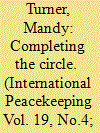

|
|
|
|
|
| Publication |
2012.
|
| Summary/Abstract |
After nearly 20 years of negotiations and peacebuilding, Palestinians are no nearer to self-determination. This article explains this failure through an analysis of the context and peacebuilding framework created as a product of the Oslo Accords and the assumptions of Western donors about how peace would be achieved. It argues that the occupied Palestinian territory (oPt) is subject to an assemblage of colonial practices - some of which are the product of Western peacebuilding. While the practices of the occupying power, Israel, has constituted one part of the colonial equation (extracting and controlling resources and settling its own people), Western peacebuilding has played another through its pursuit of a modern version of the 'mission civilisatrice'. The ideological discursive framework that binds these two parts of the colonial equation together and gives them common purpose is the 'partners for peace' discourse that has been used to justify a multitude of practices, including the arrest and detention of Palestinian politicians, military action, the withdrawal of aid and regime change.
|
|
|
|
|
|
|
|
|
|
|
|
|
|
|
|
| 2 |
ID:
115321
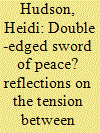

|
|
|
|
|
| Publication |
2012.
|
| Summary/Abstract |
Using a postcolonial-feminist approach, this article argues that the way in which gender is framed in peace interventions is symptomatic of the hegemonic way in which the discourses about the representation and protection of women within the liberal intervention model are constructed and institutionalized. Through an analysis of international discourses on the politics of inclusion/exclusion, protection, as well as sexual and gender-based violence (SGBV), it illustrates the disempowering effect of instrumentalist interpretations of women's agency. The article concludes that the embedded violence of liberal peacebuilding becomes even more pronounced when the gendered inner workings of international organizations, among others, are placed under scrutiny. It proposes a critical postcolonial-feminist vision that is resistant to universalist conceptions of women, gender and self to overcome the under-theorized gender dimensions of liberal peacebuilding.
|
|
|
|
|
|
|
|
|
|
|
|
|
|
|
|
| 3 |
ID:
115322
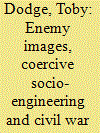

|
|
|
|
|
| Publication |
2012.
|
| Summary/Abstract |
Previous attempts to explain US policy towards Iraq from 2003 onwards have understood US intentions and actions through a coherent, rational-utility-maximizing model of the state. This article seeks to de-centre this rationalist explanation by examining the ideational drivers that shaped the Bush administration's understanding of Iraq and hence its policy towards the remaking of its post-invasion politics. In order to gain ideational coherence, both the Iraqi Ba'ath Party and the Sunni community were understood through a 'diabolical enemy image' schema. As a consequence, an 'exclusive elite pact' was constructed, a post-war political system specifically built to exclude former members of the Ba'ath Party and marginalize the participation of the Sunni community. This policy of exclusion drove the country into civil war. One side, Iraq's new ruling elite, fought to impose a victor's peace, the violent suppression of former members of the old regime. On the other, those excluded launched an insurgency to overturn the post-war political order.
|
|
|
|
|
|
|
|
|
|
|
|
|
|
|
|
| 4 |
ID:
115326


|
|
|
|
|
| Publication |
2012.
|
| Summary/Abstract |
This article investigates the performance of Poland and the Czech Republic in the US-led regime change wars in Iraq and Afghanistan. The article indicates a significant gap between the Czech and Polish discourses and practices related to the two countries' contributions. In the two crises, discourses revolved around the notion of universal values and support for legal and legitimate peace support operations mandated by the UN. But the practices did not match those discourses and were actually driven by the beliefs that form the Atlanticist ideology. The article analyses the successful internalization of US discourses and threat perception in Poland and the Czech Republic through the use of 'cascade argumentation'. The practical results of this internalization are then examined.
|
|
|
|
|
|
|
|
|
|
|
|
|
|
|
|
| 5 |
ID:
115327
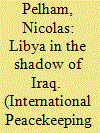

|
|
|
|
|
| Publication |
2012.
|
| Summary/Abstract |
In formulating its plans for government, the National Transitional Council (NTC), the political arm of the anti-Qaddafi uprising in 2011, was heavily guided by international thinking regarding the experience of de-Ba'athification in Iraq. In attempting to avoid 'reliving the Iraq war', the NTC, made a conscious decision to integrate the 'Old Guard' into the new order, but thereby created new challenges by alienating those who had led the rebellion. This Eyewitness is based on insights - from the author's interviews in Libya (particularly at the Second Congress of the rebel militias of April 2012), and argues that the fledgling central authority added to post-Qaddafi instability by failing to secure the buy-in of the rebel militias into their post-conflict vision of a civilian order, replete with elections. It concludes that in their zeal to correct the mistakes the West made in Iraq, Libya's new authorities may well have over compensated creating fresh obstacles to the country's stabilization and reconstruction.
|
|
|
|
|
|
|
|
|
|
|
|
|
|
|
|
| 6 |
ID:
115318
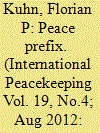

|
|
|
|
|
| Publication |
2012.
|
| Summary/Abstract |
The Western security community has increasingly militarized its politics of peace, through peacekeeping, peace-making and other policies to which the 'peace' prefix has been attributed. Peace has become a virtual concept, which at times disguises rather violent management techniques of 'global governance'. Peace, within this framework, is a practice and a policy, mantled by a narrative of a liberal, and teleological, desire for non-violence. Non-violence towards the governing institutions became viewed as peace, advancing the notion of 'peace-as-order'. A teleology of liberal development helped to securitize the 'not-yet-liberalized Other', excluding non-liberal concepts from the idea of peace. Like the baby thrown out with the bathwater, peace lost its emancipatory content. A particular peace is the result, which includes transitional justice or reconciliation as rhetorical devices for its legitimization. However, the practice of 'peace' leaves these processes to the 'losers'; lasting peace between equals remains elusive and the politics of peace an exercise in managing security.
|
|
|
|
|
|
|
|
|
|
|
|
|
|
|
|
| 7 |
ID:
115317
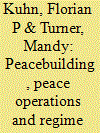

|
|
|
| 8 |
ID:
115319


|
|
|
|
|
| Publication |
2012.
|
| Summary/Abstract |
Multilateral interventions for regime change are not new, but their mutation has been congruent with an aggressive attempt to introduce liberal values into peacekeeping and related operations discernible from the 1990s. While recognizing non-coercive, needs-based elements of interventions for peace, this article contends that regime change wars have harmonized with the UN's facilitation of aggressive peace missions and coercive peacebuilding. In the 1990s the perceived failures of, and demands on, the UN, led to a general policy of permissiveness for Western states to pursue regime change, accompanied by reconstruction and development opportunities to promote neoliberal ideas of political economy in war-torn societies. This article focuses on two aspects of international operations fostered through or by the UN: the militarization of peace missions and peacebuilding through neoliberal political economy. It commends further research into the networks of power and resistance that have populated aggressive peace.
|
|
|
|
|
|
|
|
|
|
|
|
|
|
|
|
| 9 |
ID:
115320


|
|
|
|
|
| Publication |
2012.
|
| Summary/Abstract |
The sheer ambition and scale of UN peacebuilding today inevitably invokes comparison with historic practices of colonialism and imperialism, from critics and supporters of peacebuilding alike. The legitimacy of post-settlement peacebuilding is often seen to hinge on the question of the extent to which it transcends historic practices of imperialism. This article offers a critique of how these comparisons are made in the extant scholarship, and argues that supporters of peacekeeping deploy an under-theorized and historically one-sided view of imperialism. The article argues that the attempt to flatter peacebuilding by comparison with imperialism fails, and that the theory and history of imperialism still provide a rich resource for both the critique and conceptualization of peacekeeping practice. The article concludes by suggesting how new forms of imperial power can be projected through peacebuilding.
|
|
|
|
|
|
|
|
|
|
|
|
|
|
|
|
| 10 |
ID:
115323
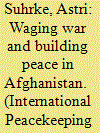

|
|
|
|
|
| Publication |
2012.
|
| Summary/Abstract |
Visions of peace and the means of violence have been strategically joined at the very foundation of the international engagement in Afghanistan since 2001. The two forces have sustained each other - peacebuilding efforts have generated legitimacy and political support for the war - but the violence has also undercut efforts to create structures of peace and prosperity, thus hastening the international search for an exit. The contradictions between simultaneously waging war and building peace in Afghanistan were recognized too late, or not at all, in international peacebuilding circles. During the early phase of the intervention, in particular, the aid and rights communities were vocal advocates for a strong international military presence. The discourse on 'security' as a prerequisite for development and peace has continued to mask the underlying tensions in the security-peacebuilding nexus as they appear in Afghanistan's internationalized civil war.
|
|
|
|
|
|
|
|
|
|
|
|
|
|
|
|
| 11 |
ID:
115325


|
|
|
|
|
| Publication |
2012.
|
| Summary/Abstract |
Violence in the context of international peace interventions is rarely problematized. It is associated with the conflict belligerents, while the violence deployed by peacekeepers is not conceived as such, but as 'peace operations' that mitigate, subdue or deter the belligerents' violence. This common interpretation comes from a discrimination between 'local' and 'international' that is considered theoretically necessary to understand interventions. The distinction obscures the ways in which the two kinds of violence are intimately intertwined and tied to competing claims about legitimate agency. This article analyses the peace interventions (2002-11) that led to regime change in Côte d'Ivoire. Based on this case-study analysis, it argues that violence and its representations affect and constitute agency. In Côte d'Ivoire, strict ontological commitments to the 'local' and 'international' quality of agents neglect the violence used in the context of intense negotiations over, and attempts at imposing, a line between 'local' and 'international' agency. The analysis points to how violence established, transformed, and enabled agency under conditions of international peace interventionism in Côte d'Ivoire.
|
|
|
|
|
|
|
|
|
|
|
|
|
|
|
|
|
|
|
|
|